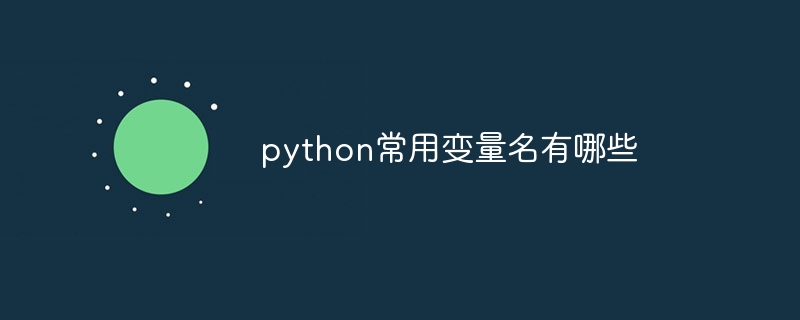
Python variable names can contain letters, numbers, and underscores, must start with a letter or underscore, and are case-sensitive. Variable names should be descriptive and clearly reflect what the variable represents. Common naming conventions include camel case and underscore case. Choosing meaningful variable names and following naming conventions can improve the readability and maintainability of your code. When naming variables, avoid using special characters and keywords.

The operating system for this tutorial: Windows 10 system, Python version 3.11.4, DELL G3 computer.
Python variable names can contain letters, numbers, and underscores, and must start with a letter or underscore. Python is case-sensitive, so uppercase and lowercase letters in variable names are different. The following are some common Python variable name rules and naming conventions:
1. Letters and underscores:
Variable names can contain letters (both upper and lower case) and underscores . For example: x, y, my_variable, average_score.
2. Numbers:
Variable names can contain numbers, but they cannot start with numbers. For example: x1, y2, variable3.
3. Case sensitivity:
Python is case sensitive, so the uppercase and lowercase letters in variable names are different. For example: my_variable and My_Variable are two different variable names.
4. Keyword restrictions:
Python has some reserved keywords that cannot be used as variable names. For example: if, for, while, etc. You can use the help('keywords') command to view all keywords in Python.
5. Know the meaning after seeing the name:
The variable name should be descriptive and can clearly reflect the meaning of the variable. This improves code readability and maintainability. For example, use age to represent age and student_name to represent student name.
6. Camel case naming:
Camel case naming is a common variable naming convention, in which the first letter of each word is capitalized and there are no underscores between words. . For example: firstName, lastName,, myVariable.
7. Underline naming:
Underscore naming is another common variable naming convention, in which words are separated by underscores. For example: first_name, last_name, my_variable.
8. Constant naming:
Python does not have a built-in constant type, but by convention, variable names in all uppercase letters are usually regarded as constants. For example: PI = 3.14159, MAX_VALUE = 100.
9. Avoid using special characters:
Special characters, such as spaces, punctuation marks, and mathematical operators, should be avoided in variable names. Only letters, numbers and underscores are allowed.
10. Choose meaningful variable names:
Variable names should be descriptive and be able to clearly express the purpose and meaning of the variable. This improves code readability and maintainability. Avoid single-letter or meaningless names and instead use descriptive names.
To summarize, Python variable names can contain letters, numbers, and underscores, must start with a letter or an underscore, and are case-sensitive. Variable names should be descriptive and clearly reflect what the variable represents. Common naming conventions include camel case and underscore case. Choosing meaningful variable names and following naming conventions can improve the readability and maintainability of your code. When naming variables, avoid using special characters and keywords.
The above is the detailed content of What are the commonly used variable names in Python?. For more information, please follow other related articles on the PHP Chinese website!




